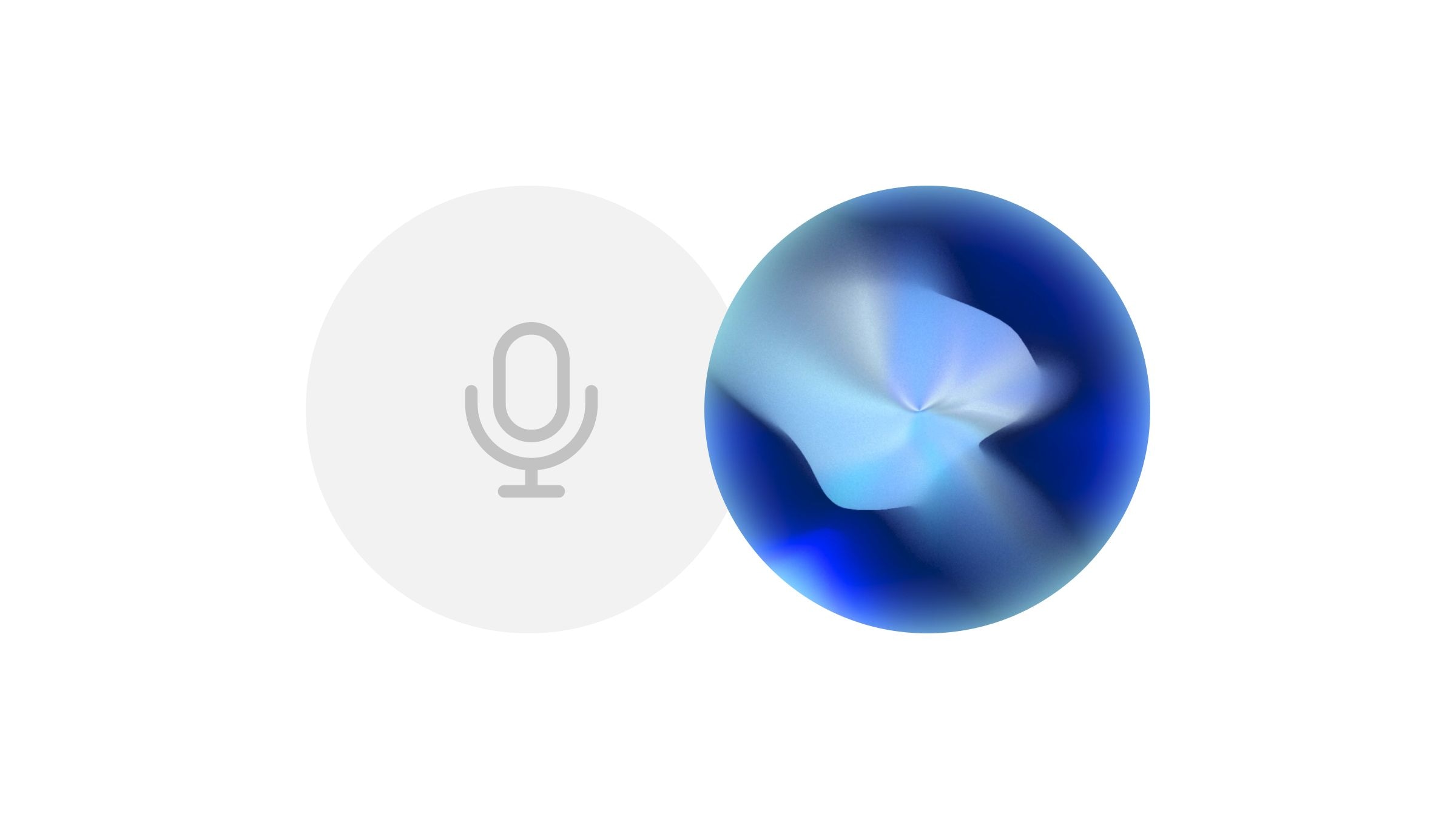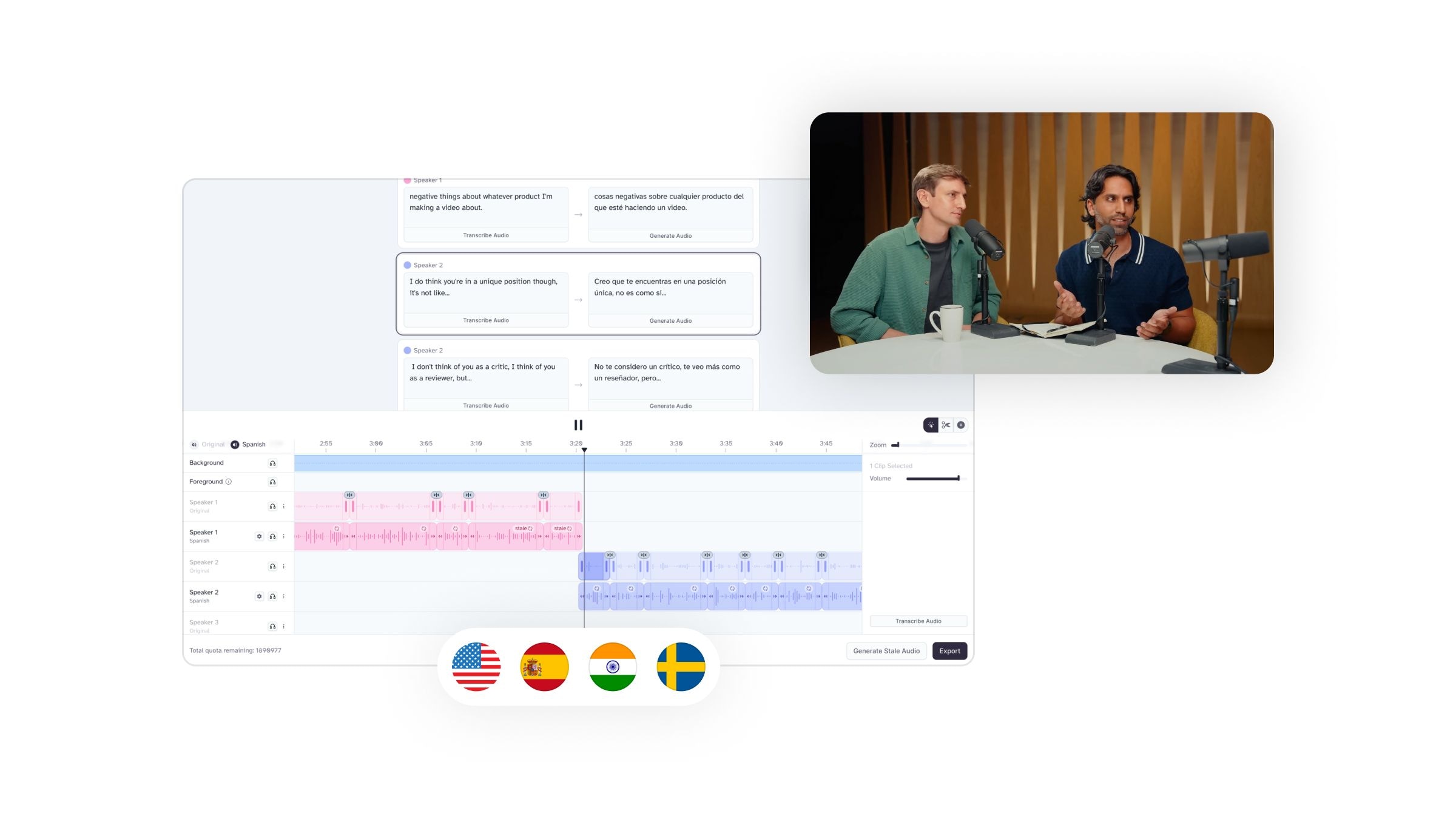
I używaj go do filmów, reklam, podcastów i nie tylko
AI może zmienić sposób, w jaki ożywiasz historie na ekranie
Sztuczna inteligencja wkracza na scenę w przyszłości dubbingu dla telewizji i filmu. W branży znanej z innowacyjnego opowiadania historii, AI dubbing zdobywa uznanie, oferując szybsze, tańsze i niezwykle wszechstronne rozwiązanie dla nałożonego głosu.
Z nami w ElevenLabs masz dostęp do najbardziej zaawansowanego oprogramowania do zamiany tekstu na mowę i Voice Cloning dzięki generatywnej technologii głosu AI.
Brzmi to przytłaczająco? To całkowicie zrozumiałe, ale jesteś we właściwym miejscu. W tym szczegółowym przewodniku przeprowadzimy cię przez tajniki AI dubbingu.
Niezależnie od tego, czy jesteś doświadczonym filmowcem, który chce usprawnić proces produkcji, czy twórcą treści, który chce odkrywać nowe możliwości, mamy coś dla ciebie.
To nie jest science fiction. Chodzi o realne, praktyczne zastosowania generatywnego głosu AI, które mogą zmienić sposób, w jaki ożywiasz historie na ekranie. Czas nauczyć się, jak AI dubbing dla filmu i telewizji otwiera przed tobą nowe możliwości.

Zanim zagłębimy się w AI dubbing, cofnijmy się na chwilę i przeanalizujmy historię dubbingu w świecie filmu i telewizji.
Korzenie dubbingu sięgają początków kina. Gdy nieme filmy przechodziły w „talkies” pod koniec lat 20., potrzeba dubbingu stała się oczywista. Filmy produkowane w jednym języku musiały dotrzeć do globalnej publiczności, a dubbing stał się rozwiązaniem.
Ta praktyka pozwoliła widzom na całym świecie cieszyć się filmowymi doświadczeniami w ich ojczystych językach, przełamując bariery językowe i rozszerzając zasięg medium.
Na początku dubbing polegał na prostych metodach, takich jak nałożone głosy na żywo lub ponowne nagrywanie dialogów. Jednak wraz z postępem technologii, techniki dubbingu również się rozwijały.
Wprowadzenie synchronizacji ust i bardziej zaawansowanych metod nagrywania dźwięku w połowie XX wieku było znaczącym krokiem naprzód. Dubbing stał się formą sztuki, gdy utalentowani aktorzy głosowi pracowali niestrudzenie, aby dopasować ruchy ust i emocje oryginalnych występów.
Ludzcy aktorzy głosowi od dawna są niedocenianymi bohaterami tradycyjnego dubbingu. Tchnęli życie w postacie, zachowując istotę oryginalnych występów, jednocześnie dostosowując je do kulturowych niuansów i preferencji różnych odbiorców.
Ci utalentowani profesjonaliści tworzyli bezszwowe występy wokalne, zapewniając, że widzowie mogli łączyć się z postaciami na ekranie, niezależnie od miejsca oglądania.
Chociaż tradycyjny dubbing dobrze służył branży przez dziesięciolecia, nie jest pozbawiony wyzwań. Proces jest często czasochłonny i kosztowny, wymagając zatrudnienia aktorów głosowych, przestrzeni studyjnej i wysiłków w zakresie synchronizacji postprodukcji.
Ponadto znalezienie idealnego dopasowania głosu do postaci może być trudne, co prowadzi do kompromisów w jakości dubbingu.
Patrząc wstecz na historię dubbingu, jasne jest, że branża przeszła długą drogę. Jednak pojawienie się AI dubbingu obiecuje wprowadzić nowy poziom wydajności i wszechstronności do świata dubbingu filmowego i telewizyjnego.
Zobaczmy, jak ta nowoczesna technologia kształtuje przyszłość opowiadania historii na ekranie.

Czas jest często kluczowy w filmie i telewizji, więc pojawienie się rozwiązań dubbingowych opartych na AI przyniosło falę innowacji. AI cicho, ale znacząco zmieniło sposób, w jaki podchodzimy do skomplikowanej sztuki dubbingu.
Rozwiązania dubbingowe oparte na AI stanowią zmianę paradygmatu w branży. Te technologie szybko zdobyły popularność, oferując przekonującą alternatywę dla tradycyjnych metod dubbingu. Co je wyróżnia, to zdolność do automatyzacji i usprawnienia procesu dubbingu.
Magia AI dubbingu tkwi w postępach w przetwarzaniu języka naturalnego (NLP) i syntezie głosu. NLP pozwala maszynom zrozumieć i interpretować język ludzki z niezwykłą dokładnością. W połączeniu z zaawansowanymi algorytmami syntezy głosu, AI może generować niezwykle realistyczne występy wokalne, które naśladują wzorce mowy i emocje ludzi.
Jak więc AI poprawiło proces dubbingu? Przede wszystkim chodzi o szybkość. AI może generować nałożone głosy w ułamku czasu, jaki zajmują tradycyjne metody. Ta wydajność nie tylko przyspiesza harmonogramy produkcji, ale także obniża koszty.
Ponadto AI nie ma ograniczeń ludzkich aktorów głosowych. Oferuje skarbnicę różnorodnych głosów, akcentów i emocji, umożliwiając twórcom znalezienie idealnego dopasowania do ich postaci. Personalizacja jest kluczowa w AI dubbingu, pozwalając na dostosowanie wysokości, tonu i stylu do unikalnych wymagań każdego projektu.

Teraz przejdźmy do sedna sprawy - jak ElevenLabs redefiniuje AI dubbing w branży filmowej i telewizyjnej.
ElevenLabs to nie jest zwykłe narzędzie AI dubbingu. Napędzane najnowocześniejszą technologią AI, nasze oprogramowanie oferuje bogactwo możliwości. Korzyści obejmują:
Przejdźmy do praktyki. Jak ElevenLabs wpisuje się w rzeczywisty krajobraz dubbingu filmowego i telewizyjnego? Oto kilka zastosowań:

I używaj go do filmów, reklam, podcastów i nie tylko
Wreszcie, ElevenLabs kładzie duży nacisk na praktyki etyczne i odpowiedzialne użycie AI. Na przykład, w przypadku Voice Cloning, wyraźna zgoda osoby, której głos jest klonowany, jest podstawowym wymogiem.
Dodatkowo, wdrożyliśmy solidne zabezpieczenia, aby zapobiec potencjalnemu niewłaściwemu użyciu technologii, zapewniając, że jest ona używana etycznie i odpowiedzialnie we wszystkich zastosowaniach.
Podróż przez świat AI dubbingu była niezwykle pouczająca. Zbadaliśmy bogatą historię dubbingu, pojawienie się AI w branży i niesamowity potencjał, jaki niesie dla filmowców i twórców treści.
Od początków niemych filmów po teraźniejszość, opowiadanie historii zawsze było sercem kina i telewizji. AI dubbing nie zastępuje ludzkich umiejętności, ale jest niezwykłym narzędziem, które umożliwia twórcom podniesienie swojego rzemiosła.
ElevenLabs to siła napędowa, która odblokowuje potencjał filmowy jak nigdy dotąd. Dzięki zaawansowanym możliwościom zamiany tekstu na mowę i Voice Cloning, to prawdziwy przełom, który przyspiesza produkcję, obniża koszty i zwiększa personalizację. To narzędzie, które szanuje i uzupełnia ludzki talent, zapewniając, że twoje historie dotrą do szerszej i bardziej zróżnicowanej publiczności.
Zarejestruj się już dziś za darmo i odkryj naszą ogromną bibliotekę głosów, dostosuj głosy i doświadcz płynnego wsparcia wielojęzycznego. Z ElevenLabs, przyjmujesz nieograniczone możliwości opowiadania historii.
Świat filmowy czeka na twój głos, a ElevenLabs jest tutaj, aby go usłyszeć.

Tłumacz audio i wideo, zachowując emocje, timing, ton i unikalne cechy każdego mówcy

A CCaaS platform now powered by native conversational AI

Workflows, our visual editor for designing complex conversation flows in agents platform, is now live.
Napędzane przez ElevenLabs Agenci